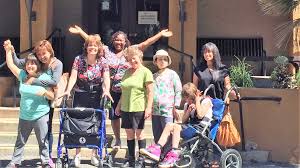In today’s world, fostering inclusivity and equality is more important than ever. One of the most impactful ways to achieve these goals is through the creation and support of inclusive group homes for disability. These spaces not only provide a safe and nurturing environment for individuals with disabilities but also transform societal perceptions, enrich communities, and empower residents to lead fulfilling lives. By exploring the multifaceted benefits of such settings, we can better appreciate their value and advocate for their widespread implementation.
Understanding Group Homes for Disability
Group homes for disability are residential facilities designed to support individuals with varying needs in a shared living environment. These homes often accommodate a small number of residents and are staffed by professionals who provide care, assistance, and encouragement. While the primary goal is to meet the specific needs of the residents, inclusive group homes go beyond that by fostering an environment of respect, independence, and community engagement.
Inclusive group homes differ from traditional care facilities by prioritizing integration and empowerment. They encourage residents to participate actively in household activities, community events, and personal growth opportunities. By doing so, these homes bridge the gap between providing essential care and nurturing the independence and dignity of individuals with disabilities.
Empowerment Through Inclusivity
One of the most transformative aspects of inclusive group homes for disability is their ability to empower residents. This empowerment stems from the sense of belonging that comes from living in a supportive and inclusive environment. Residents often develop stronger self-esteem and confidence as they are encouraged to make decisions about their lives, participate in social activities, and take on responsibilities within the home.
Inclusivity also means that these homes are designed to accommodate a diverse range of needs. Whether residents have physical, intellectual, or developmental disabilities, the homes are equipped to provide tailored support. This individualized approach helps each person thrive, ensuring they are not just cared for but genuinely valued as unique individuals.
Building Stronger Communities
Inclusive group homes for disability play a vital role in strengthening the communities in which they are situated. By integrating individuals with disabilities into neighborhoods, these homes challenge stereotypes and promote understanding. When neighbors interact with residents, they often gain a deeper appreciation for diversity and recognize the value of inclusion.
These interactions can lead to the development of more compassionate and accepting communities. Schools, local businesses, and community organizations often benefit from partnerships with group homes. Whether it’s through volunteer programs, collaborative events, or educational initiatives, the presence of inclusive group homes fosters a culture of kindness and cooperation.
Enhancing Personal Development
For individuals with disabilities, inclusive group homes offer opportunities for personal growth that might not be possible in other settings. Residents are encouraged to pursue education, employment, and hobbies, which contribute to their overall well-being. Group homes often provide resources and support for skill development, such as cooking, budgeting, and communication, which are essential for leading an independent life.
Living in a group home also allows residents to form meaningful relationships with peers and caregivers. These connections are crucial for emotional health and social development. In an inclusive setting, individuals learn to navigate interpersonal dynamics, resolve conflicts, and build friendships, all of which are essential life skills.
A Positive Impact on Caregivers
Inclusive group homes for disability also benefit caregivers. Families of individuals with disabilities often face significant emotional and physical demands. Knowing that their loved ones are in a safe, supportive, and inclusive environment provides much-needed peace of mind. This reassurance allows families to focus on their own well-being while maintaining a strong connection with their loved ones.
Professional caregivers working in group homes also experience the rewards of their efforts. They are part of a meaningful mission to empower individuals and create inclusive communities. This sense of purpose often translates into greater job satisfaction and a deep sense of accomplishment.
Economic and Social Benefits
Beyond the personal and communal advantages, inclusive group homes for disability offer broader societal benefits. They create jobs for caregivers, therapists, and administrative staff, contributing to the local economy. Additionally, when residents are supported to pursue employment or entrepreneurship, they become active contributors to society, reducing dependency and fostering economic participation.
From a social perspective, inclusive group homes reduce the stigma surrounding disabilities. They serve as a model for what inclusive living can look like, inspiring policymakers, organizations, and individuals to adopt similar practices in other areas of life. By demonstrating the success of integration, these homes pave the way for a more equitable society.
Overcoming Challenges
Despite their many benefits, the implementation of inclusive group homes for disability comes with challenges. Funding and resource allocation are often significant hurdles. Establishing and maintaining these homes require financial investment, which can be difficult to secure in some regions.
Another challenge is ensuring that inclusivity extends beyond the physical environment. True inclusivity requires continuous education and advocacy to address societal attitudes and biases. Communities, caregivers, and policymakers must work together to create an environment where individuals with disabilities are not just accommodated but celebrated.
The Path Forward
The transformative power of inclusive group homes for disability cannot be overstated. By providing a nurturing environment that values independence, respect, and community engagement, these homes create opportunities for individuals with disabilities to thrive. Their impact extends far beyond the walls of the residence, influencing families, neighborhoods, and society as a whole.
As we move forward, it is essential to advocate for the expansion of inclusive group homes. This includes pushing for policies that support their funding and development, raising awareness about their benefits, and challenging misconceptions about disability. Together, we can create a world where every individual, regardless of ability, has the opportunity to live a fulfilling and inclusive life.


